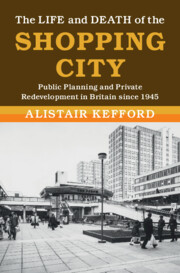 The Life and Death of the Shopping City
The Life and Death of the Shopping City Published online by Cambridge University Press: 31 March 2022
This chapter examines public responses to new urban shopping spaces and interrogates the idea of voracious consumer demand which underpinned major retail developments. I show that the projections of ‘demand’ which were put together in support of redevelopment were not borne out by the poor trading experience of many new shopping facilities after opening. The politically embarrassing failures of high-profile ‘white elephants’ prompted both government and the development industry to take much more seriously the complexities and limits of ‘demand’ in the affluent society. The chapter also probes some broader questions about the nature of Britain’s post-war affluent society. By the later 1960s, it was already clear that projections of inexorably expanding prosperity were misjudged, and the installation of expensive new shopping facilities at the heart of British urban life began to look somewhat misplaced. I highlight the rising currents of protest against the commercially driven course of urban transformation which became increasingly pronounced at this time. Citizens, activists and academics began to critique the encroachment of the retail economy over ever more of the city’s shared spaces. The chapter also considers the political implications of the widespread installation of enclosed, privately owned shopping spaces across the urban centres of post-war Britain.
To save this book to your Kindle, first ensure no-reply@cambridge.org is added to your Approved Personal Document E-mail List under your Personal Document Settings on the Manage Your Content and Devices page of your Amazon account. Then enter the ‘name’ part of your Kindle email address below. Find out more about saving to your Kindle.
Note you can select to save to either the @free.kindle.com or @kindle.com variations. ‘@free.kindle.com’ emails are free but can only be saved to your device when it is connected to wi-fi. ‘@kindle.com’ emails can be delivered even when you are not connected to wi-fi, but note that service fees apply.
Find out more about the Kindle Personal Document Service.
To save content items to your account, please confirm that you agree to abide by our usage policies. If this is the first time you use this feature, you will be asked to authorise Cambridge Core to connect with your account. Find out more about saving content to Dropbox.
To save content items to your account, please confirm that you agree to abide by our usage policies. If this is the first time you use this feature, you will be asked to authorise Cambridge Core to connect with your account. Find out more about saving content to Google Drive.